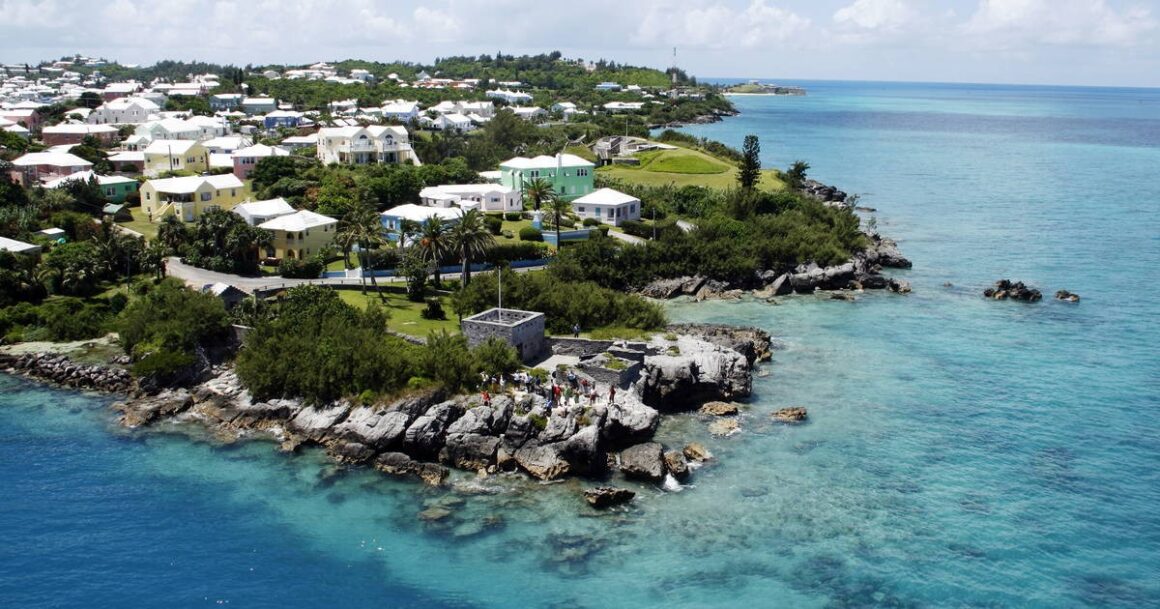The tiny Atlantic island stands to gain more from Trump’s Paris Agreement reversal than America ever could
Bermuda is a territory of the United Kingdom of Great Britain and Northern Ireland, which most of the world knows simply as the U.K. The U.K. is commonly thought of as comprising only England, Scotland, Wales, and Northern Ireland, but Bermuda is as much an independent country as any of the aforementioned. It’s easy to understand how Bermuda could be overlooked; Bermuda’s population is 65,000, or one-tenth of 1% of the U.K.’s population; by comparison, the population of London is 9.3 million. According to the World Bank, only 12% of Bermuda’s exports and 15% of imports are to and from the U.K., as compared to over 80% of exports and 66% of import trade with the US. Bermuda is also geographically closer to the U.S. than it is to Britain, and the value of the Bermuda dollar is pegged to that of the U.S. dollar, not the Pound Sterling. The U.S. and Bermuda are so connected, in fact, that Bermuda’s Office of Website Management, Bureau of Public Affairs, manages a comprehensive website as a portal for information from the U.S. State Department regarding Bermuda’s transparency policies, accounting practices, regulations, etc.
Most non-Bermudians imagine that the island’s economy is based on tourism like Jamaica or French Polynesia, but Bermuda’s economy is finance-based
In many ways, besides its 650-mile geographic proximity, Bermuda is more connected with the U.S. than with the U.K., though, as a British territory, Bermuda is still a signatory to the Paris Climate Change Convention and the U.S. is not. The withdrawal of the United States still hasn’t materialized into on-the-ground changes in emissions from America’s biggest polluters, but it has sent a message to our industrial rivals, that the U.S. government supports domestic industrial interests that choose competitive advantage over environmental sensitivity.
As U.S. interests make the shift, space may begin to open up between American products and those from competitive interests in countries that are abiding by the Paris Agreement. Bermuda could play an important role in how this space is exploited. Most non-Bermudians imagine that the island’s economy is based on tourism like Jamaica or French Polynesia, but Bermuda’s economy is finance-based; and it specializes in a service sector the finance world calls FDI, meaning Foreign Direct Investment. FDI is Bermuda’s primary business; in other words, Bermuda is a broker for international investment and commerce; and the United States (or at least its corporate interests) is its biggest customer. So, it will be in a unique position to triage the disparate market indexes that U.S. non-compliance will create. The tiny Atlantic island stands to gain more from Trump’s Paris Agreement reversal than America ever could since Foreign Direct Investment represents nearly 80% of Bermuda’s GDP and heavy manufacturing represents less than 12 percent of the U.S. GDP.
The U.S. posture regarding Bermuda has been very consistent for decades. It focuses on Bermuda as an offshore financial conduit to the rest of the world. For this relationship to operate properly, concerns about money laundering, graft, and other lack of legal compliance must be held at bay; so, the U.S. strongly supports Bermuda’s commitment to financial fidelity in an often complex international business environment. Bermuda adheres to GAAP and is affiliated with just about every international self-regulating regime in existence and complies with myriad treaties and international agreements that make the island the ultimate offshore finance partner to any nation or corporation that’s serious about global enterprise.
Official U.S. positions are typically aimed at the U.K. proper, rather than at Bermuda specifically. However, the U.S. relationship with the U.K. is complex. England has been an important trading partner since soon after the Revolutionary War, but the U.S. also traded heavily with the U.K.’s rival (c. 1776), France, and even China (mostly for tea and porcelain). Westerners still call heirloom tableware, “the good china…” Immigrants poured in from Europe and Asia, looking for religious freedom and economic opportunity. They arrived with their culture, their food, their products, and their ties to home, which helped to facilitate international trade, even before the formation of the United States. Many of those trade partners are the member-states of the European Union and signatories of the Paris Climate Change Convention. The U.K.’s exit from the E.U. fundamentally changes the U.S./U.K. trade relationship but without the same impact in Bermuda. The tiny island trades in the financial services sector which is less likely to be tariffed, especially by an administration that’s notably resistant to taxing the wealthy.
The most effective communication channels to keep Bermuda apprised of U.S. policy positions are through the bureaucratic agencies under which Bermudian financial services are regulated. Should the U.S. withdrawal from the Paris Agreement result in changes in U.S. policy that would affect Bermuda, it’s more likely to be in the form of new administrative rules within these agencies than by overt acts of Congress or the Executive.
#ForeignDirectInvestment #Bermuda #ParisClimateChangeConvention #ParisAgreement #PublicPolicy #Brexit
References
Bermuda. (2017, June 29). Retrieved August 31, 2018, from https://www.state.gov/e/eb/rls/othr/ics/2017/wha/270047.htm
Bermuda Trade Summary. (2015). Retrieved August 31, 2018, from https://wits.worldbank.org/CountryProfile/en/Country/BMU/Year/2015/Summarytext

